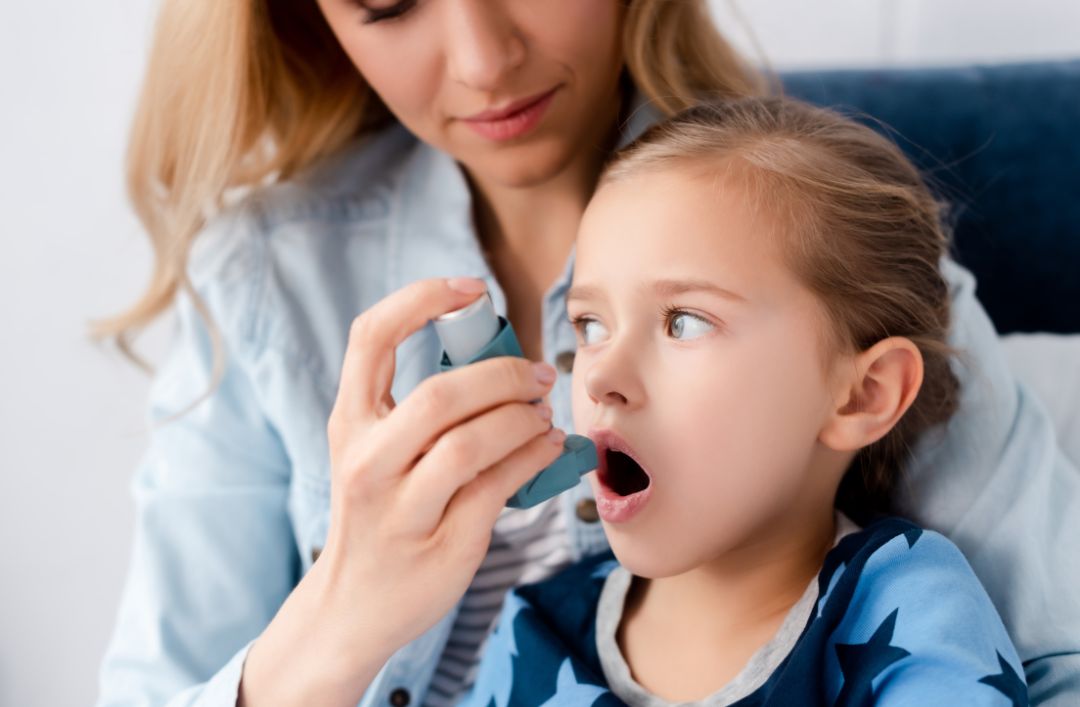Asthma doesn’t always announce itself with a dramatic episode. For many families, it begins with something as simple as a lingering cough, shortness of breath during play, or wheezing that only happens at night. These subtle asthma symptoms in children often slip under the radar, especially in children who may not yet have the language to express what they’re feeling. Parents often chalk it up to a cold, allergies, or just being out of shape, until the symptoms worsen or become frightening.
At Kratz Allergy & Asthma, we’ve seen how early recognition of asthma symptoms can change the course of a patient’s life, especially for children. Spotting those early red flags and getting the right care quickly can prevent severe flare-ups, reduce emergency visits, and help kids (and adults) breathe easier every single day. If you live in or near Port Richey, FL, and have noticed something off with your or your child’s breathing, it may be time to take a closer look at what asthma really looks like across different ages.
Recognizing Asthma Symptoms in Children
In children, asthma symptoms in children can be confusing. They don’t always match what adults experience, and many kids aren’t sure how to describe what they’re feeling. That’s why it’s important to look closely at patterns and behaviors, especially during activity or sleep. Children often show signs of asthma with:
- Frequent coughing, especially at night, during play, or when laughing
- Wheezing or a whistling sound when breathing out
- Shortness of breath during physical activity
- Complaints of chest tightness or “hurting lungs”
- Unusual fatigue during or after running or playing
For some children, these symptoms only occur during specific triggers, such as after exposure to cold air, smoke, dust, or pet dander. Others might experience them year-round. Many times, parents will notice their child avoids playing sports or running with others, not because they’re uninterested, but because breathing becomes too difficult. These red flags should never be ignored. When left unaddressed, they can escalate into full-blown asthma attacks.
Pediatric Asthma Triggers You Might Overlook
Asthma doesn’t happen in a vacuum. While genetics play a role, many kids react to specific triggers in their environment. These triggers can be hidden in plain sight, making it difficult for parents to connect the dots.
Here are a few common (and surprising) asthma triggers in children:
- Seasonal pollen and outdoor mold
- Cold air or sudden changes in temperature
- Viral infections like colds or flu
- Indoor dust mites or pet dander
- Secondhand smoke or strong odors from cleaning products
Sometimes, asthma symptoms in children only flare up after a cold. That’s why many children are first misdiagnosed with recurring bronchitis. If your child seems to “catch” every cold and it always goes to their chest, it’s worth checking in with a pediatric asthma specialist. The sooner you identify the triggers, the easier it becomes to manage symptoms before they escalate.
What Asthma Looks Like in Teens and Adults
By the time kids become teenagers, some outgrow their asthma symptoms, or at least that’s how it appears. In reality, asthma can shift with age. Many teens and adults experience more subtle signs like tightness in the chest or occasional breathlessness, which they may ignore or attribute to stress, fitness level, or allergies.
Common asthma symptoms in adults include:
- Wheezing, especially during exercise or at night
- Chronic coughing, particularly in the early morning
- Shortness of breath during mild activity
- A feeling of pressure or tightness in the chest
- Symptoms that worsen with weather changes or allergens
One of the biggest risks in adults is mistaking asthma symptoms for something less serious. When you’ve lived with mild symptoms for years, it’s easy to overlook their impact. But asthma is a chronic condition that benefits from consistent care and treatment, no matter your age.
The Dangers of Not Treating Pediatric Asthma Early
Pediatric asthma isn’t something that improves with time on its own. In fact, failing to treat it early can lead to long-term damage to the airways. Children with unmanaged asthma are more likely to miss school days, suffer from poor sleep, and struggle with physical activity. They may also experience increased anxiety, especially if they’ve had frightening breathing episodes in the past.
Asthma can also impact emotional health. Kids might feel left out or embarrassed during gym class or recess. They may avoid speaking up when they’re struggling to breathe, fearing they’ll draw attention to themselves. This can lead to a cycle where symptoms worsen, but the child tries to hide them. Prompt diagnosis and treatment help break this cycle. It gives families the tools they need to monitor asthma symptoms in children, prevent attacks, and help their children feel confident and safe.
Symptoms That Should Never Be Ignored
Not all asthma symptoms are mild. Whether in kids or adults, certain signs point to a potentially serious flare-up and need immediate attention. Seek care right away if you or your child experience:
- Severe shortness of breath or rapid breathing
- Difficulty speaking in full sentences
- Bluish color around the lips or fingernails
- Retractions (sucking in of skin around ribs or neck when breathing)
- No improvement after using a rescue inhaler
These symptoms could indicate a severe asthma attack. Early intervention is critical. That’s why we encourage every family dealing with asthma to have a clear action plan, know how and when to use medication, and never wait too long to seek medical help.
Asthma Diagnosis and What to Expect
If your child is showing signs of asthma, the first step is a proper diagnosis. This usually starts with a detailed health history and symptom review. We’ll ask about what triggers symptoms, when they occur, and how they’ve changed over time. Depending on age and ability, a breathing test called spirometry may be used to measure lung function. This painless test helps assess how well the lungs are working and whether airways are inflamed or constricted. For younger children, we rely more on symptom patterns and medical history.
Once a diagnosis is made, we create a treatment plan tailored to your or your child’s specific needs. This often includes daily control medication to prevent symptoms, and a rescue inhaler for use during flare-ups. For children, education is also a big part of the plan, helping both the child and the parents feel confident in managing symptoms at home and school.
How We Help Children Manage Their Asthma Daily
At Kratz Allergy & Asthma, we don’t just hand you an inhaler and send you on your way. We work closely with families to create personalized asthma management plans. For children, this often means helping them learn how to recognize their own asthma symptoms in children, use medication properly, and avoid known triggers. We also communicate with schools to ensure your child has access to their inhaler during the day and that staff are aware of any emergency procedures. Asthma management is a team effort, one that includes doctors, parents, teachers, and the child themselves.
Here’s how we support long-term pediatric asthma care:
- Routine monitoring and lung function testing
- Adjustments to medications as children grow
- Allergy testing and trigger identification
- Step-by-step action plans for school and home
- Support for parents navigating insurance and prescriptions
When children know they have support, they gain confidence in their bodies and in managing their condition. That’s the real goal, not just symptom relief, but empowerment.
Asthma Treatment in Port Richey, FL
If you live in Port Richey or the surrounding areas, you don’t have to search far for trusted asthma care. Our team at Kratz Allergy & Asthma provides compassionate, evidence-based treatment to families in this community. Whether your child has just started showing asthma symptoms in children, or you’ve been living with asthma for years without a formal diagnosis, we’re here to help you breathe better and live more fully.
Our Port Richey office is equipped to serve both pediatric and adult patients. We offer spirometry testing, allergy evaluations, medication management, and ongoing care that adjusts with your lifestyle and needs. We believe every patient deserves to be heard, and every child deserves a chance to run, play, and sleep soundly without worrying about their next breath.
Breathe Easier with Expert Asthma Care
Living with asthma doesn’t have to mean holding back. Whether you’re a parent worried about your child’s breathing or an adult dealing with symptoms that have gone unchecked, the right care makes a world of difference. At Kratz Allergy & Asthma, we’re here to listen, guide, and treat, so you and your family can feel in control of your health again.
Schedule a consultation today and let’s talk about what you’ve been experiencing and map out a personalized plan that works. The sooner we get started, the sooner you’ll breathe easier.


